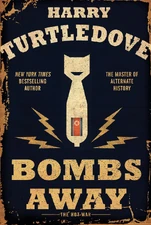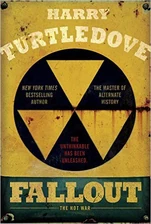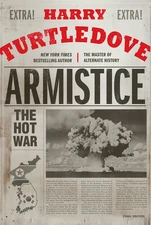| Leonid Tsederbaum | |
| Fictional Character | |
| The Hot War POD: November, 1950 | |
| Appearance(s): | Bombs Away; Fallout† |
| Type of Appearance: | Direct |
| Nationality: | Russian SSR, Soviet Union |
| Date of Death: | 1951 |
| Cause of Death: | Self-inflicted gunshot wound |
| Religion: | Officially atheist (secular Jew) |
| Occupation: | Navigator |
| Military Branch: | Soviet Air Force (World War III) |
Leonid Tsederbaum (d. 1951) was the navigator in Boris Gribkov's Tu-4 during World War III.[1] He was a Jew, which Gribkov privately noted on multiple occasions. He also became Gribkov's self-appointed conscience and made vague criticisms of the USSR throughout the war.
In January 1951, Gribkov, Tsederbaum, and the rest of the crew were transferred to an airbase in Provideniya, the location in the Soviet Union that was closet to the American west coast.[2] On 23 January, the U.S. dropped several atomic bombs in Manchuria.[3] Joseph Stalin ordered retaliatory attacks in Europe on 1 February.[4] The U.S. destroyed Pechenga on 4 February. In response, Soviet flyers destroyed Elmendorf Air Force Base on 7 February.[5]
Another round of American bombs prompted the USSR to invade West Germany on 17 February. After the Soviets launched a successful drive, the U.S. was able to disrupt Soviet supply lines with atom bombs a week later. In response, on 1 March, the flyers at the Provideniya base were sent west in Tu-4s painted to look like B-29s. With tremendous luck the attacks were mostly successful. Tsederbaum directed Gribkov's bomber to the Seattle area.[6]
After a successful bombing run, the crew turned the plane back to the Pacific Ocean. Despite a tense flight that saw the fuel gauge fall into the red, Tsederbaum directed the bomber to the Red Fleet ships tasked with picking up the crew. They landed the plane in water with the entire crew surviving the trip and the landing. They were taken aboard a destroyer called the Stalin. When Gribkov helped Tsederbaum aboard, Tsederbaum promptly kissed Gribkov on the cheek.[7]
During the voyage, the ship's captain, Anatoly Edzhubov, informed Gribkov's men that several ports, including Petropavlovsk, the Stalin's original destination, had been destroyed by the U.S. Edzhubov also informed Gribkov that Provideniya had also been destroyed. They were now headed to Korf (which Gribkov had never heard of).[8] Prior to their arrival, Radio Moscow suddenly went off the air. When it did come on, the broadcasters were unfamiliar and the signal was weak. When they arrived in Korf proper, Joseph Stalin gave a broadcast speech, confirming that Moscow had been subjected to atomic bombing, but he'd survived.[9]
Tsederbaum, Gribkov and the rest of crew received a hero's welcome in Korf.[10] They were taken to Kuibishev, the new capital of the Soviet Union, and received Hero of the Soviet Union medals and were extensively photographed. Tsederbaum was quietly skeptical of the whole process, as Gribkov's crew were the only bombers who received the Hero of the Soviet Union medals (suggesting they were the only crew to make it back).[11] Tsederbaum pressed Gribkov for any knowledge the pilot might have for their next assignment. Tsederbaum also privately challenged some of Gribkov's presumptions about the nobility of their socialist, asking Gribkov which major city he wanted to bomb next: Paris, London, or Rome. Gribkov assured Tsederbaum that he didn't want to bomb any other cities, but that he served the Soviet Union. Tsederbaum accepted the answer, conceding he would also follow orders.[12]
In mid-April, the crew transferred to an airfield outside of Leningrad. They took a train to Moscow, and were able to see the damage to the heart of the city first hand. They were flown the rest of the way, and could also see the damage inflicted on Leningrad. Tsederbaum quietly noted that their crew had done the same thing to Seattle.[13]
In the closing days of April, Gribkov's plane was equipped with a new "Identification Friend or Foe" (IFF) designed to confuse American planes. The Soviets knew that the U.S. changed their IFF codes on the first of the month, and so they had some latitude.[14] The crew then took a circuitous route through southern Europe (including violating Yugoslavian airspace), finally delivering an atomic bomb to Bordeaux, France. (Their commanding officer Osip Milyukov, had described the plan as simple. Tsederbaum had actually disagreed aloud.) The IFF let them get home safely,[15] although they did have a near-miss in early May when their airfield was bombed by the Americans using conventional explosives.[16]
In June, the crew was transferred to Soviet-held Munich. The base commander, Colonel Madinov, informed them that they would be attacking Paris. Tsederbaum subtly conveyed his displeasure with this plan to Gribkov, but didn't actually protest.[17] The crew was assigned a new radioman, Klement Gottwald, a Sudeten German who spoke excellent English. No one was enthusiastic about destroying one of the world's great cities, but Paris was a critical transportation hub, and an attack there would hurt the Americans' ability to resupplying troops in Germany.[18] The next day, with the IFF and Gottwald providing cover, and with Tsederbaum's navigation, the crew was able to drop an atomic bomb near the Arc de Triomphe. Prior to the bombing, Tsederbaum reminded everyone that Hitler had wanted Paris burning, but it was the Soviets had their wish granted. Gribkov did not like the comparison.[19]
While the crew returned to Munich, and were even briefly regarded as heroes by their comrades, the guilt continued to eat at Tsederbaum. Finally, one night Tsederbaum shot himself in a latrine. Co-pilot Vladimir Zorin found Tsederbaum first, and informed Gribkov, who quickly went through Tsederbaum's pockets. He found a note from Tsederbaum, expressing the hope that future generations would not hate Tsederbaum for the cities he'd helped destroy. Gribkov burned the note, realizing that the MGB would come down on Tsederbaum's family if they found it.[20] Nonetheless, Tsederbaum's suicide placed the remaining crew under suspicion.
References[]
- ↑ Bombs Away, pg. 143, ebook.
- ↑ Ibid., pgs. 25-29.
- ↑ Ibid., pgs. 55-58.
- ↑ Ibid., pgs. 64-65, 70.
- ↑ Ibid., pg. 93.
- ↑ Ibid., pgs. 141-145.
- ↑ Ibid., pgs. 155-159.
- ↑ Ibid., pgs. 176-177.
- ↑ Ibid., pg. 179.
- ↑ Ibid., pgs. 179-180.
- ↑ Ibid, pgs., 214-215.
- ↑ Ibid., pgs. 215-217.
- ↑ Ibid., pgs. 243-247.
- ↑ Ibid., pgs. 307-309.
- ↑ Ibid., pgs. 310-311.
- ↑ Ibid., pgs. 337-340.
- ↑ Ibid., pgs. 426-428.
- ↑ Ibid., pg. 429.
- ↑ Ibid., pg. 430.
- ↑ Fallout, pgs. 7-11.
| |||||||||||||||||||||


